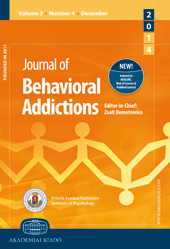The effects of belief in good luck and counterfactual thinking on gambling behavior
The effects of belief in good luck and counterfactual thinking on gambling behavior
Author(s): Myoung-Ho Hyun, Young-Sil Kwon, So-Ra KimSubject(s): Metaphysics, Cognitive Psychology, Psychology of Self, Behaviorism, Substance abuse and addiction
Published by: Akadémiai Kiadó
Keywords: luck; belief in good luck; counterfactual thinking; gambling behavior;
Summary/Abstract: One’s belief in good luck, and belief that it is a personal trait, could play a crucial role in gambling behavior, and can lead gamblers to have an irrational anticipation to win and to over-generalize their subjective sense of control. And upward counterfactual thinking has been considered to be a factor that offsets those irrational beliefs. This study examined the effects of belief in good luck and of upward counterfactual thinking on gambling behavior. Methods: The subjects of the study were 52 college students who had been classified as nonproblematic and non-pathological gamblers. They were assigned into one of two groups, distinguished by having either high (n = 25) or low (n = 27) levels of self-perception of luck, as determined by their scores on the Belief in Good Luck (BIGL) Scale. The subjects were assigned to different groups according to their reported experience of upward counterfactual thinking. Results: We found that those who had high BIGL scores spent more money on gambling than those who had low BIGL scores. Moreover, after taking into account the upward counterfactual thinking, the subjects with high BIGL scores showed a dramatic decrease in their expectations of winning. Discussion: The results indicate that to perceive luck as a personal and internal trait could affect gambling, which is one of the cognitive errors for gambling addiction. On the other hand, given that upward counterfactual thinking plays an important role in reducing cognitive errors, it could act as a protective factor against gambling addiction.
Journal: Journal of Behavioral Addictions
- Issue Year: 4/2015
- Issue No: 4
- Page Range: 236-243
- Page Count: 8
- Language: English

